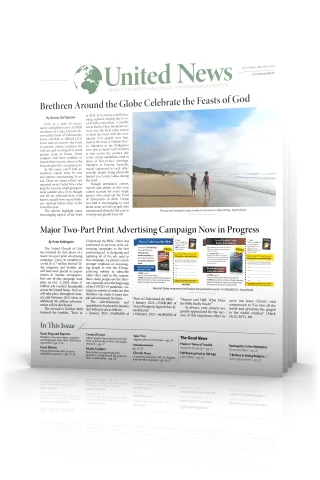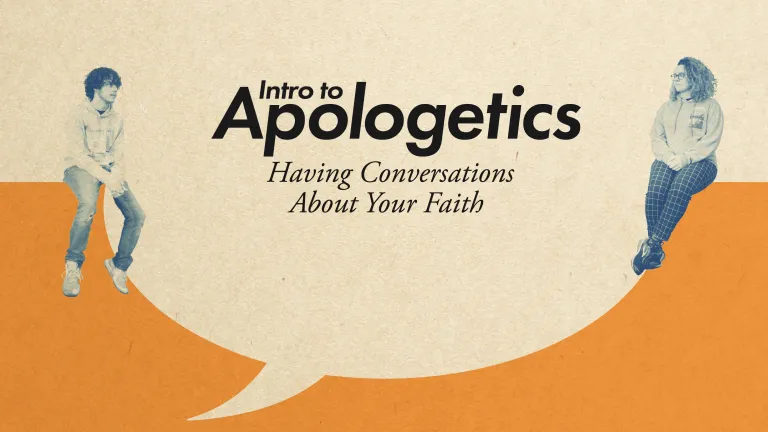Apologetics in the Workplace

It is important that we know how to give a defense for our way of life, doctrinal beliefs and the existence of God in respectful and appropriate conversations.
Having a conversation about religion in our secular society and in our places of work can be an intimidating task. For many Christians, the realities that they face on social media and in relationships with others—even at work—point to a society that has become less tolerant and accepting of the Christian faith because a Christian’s beliefs, lifestyle and values contradict the prominent voices of our society.
As ambassadors for Christ and witnesses of the coming Kingdom of God to the world, it is easy to become defensive when we hear a claim that simply isn’t true or an offhand remark mocking God or faith. However, when done correctly, apologetics can be an incredible tool to gain respect from both skeptics and non-skeptics. It may even help them reconsider their own views. Every work environment is different, but having respectful and appropriate conversations about our faith with coworkers is an important way that we can live out our faith.
Apologetics
Giving a well-reasoned and graceful defense—an answer that is both coherent and relevant to the listener—is the foundation of Christian apologetics.
As Solomon said in the book of Proverbs, “To make an apt answer is a joy to a man, and a word in season, how good it is!” (Proverbs 15:23, English Standard Version). Though the way we live can be our greatest testament and source of credibility, it should also spark conversations with those around us about our faith. It is important we know how to give a defense not just of our way of life and doctrinal beliefs, but also for God’s existence and the credibility of the Bible.
When disagreeable topics come up, it’s especially important that we understand the depth of the other person’s statements and the premises for their personal beliefs before we make a defense. If we ask a question even as simple as, “What do you mean when you say . . . ?” we can better understand what the true barriers are towards God, Christians and their faith. For some there are intellectual barriers, for others existential or personal dilemmas with God and so forth. Whatever it may be, that place is where we need to start. We shouldn’t begin by just saying what we presume they need to hear.
Let’s illustrate
First, let’s start off with an example of ineffectiveness. Say, in a conversation, someone says he or she doesn’t think the Bible was actually inspired by God. If we respond, “Well, the Bible says, ‘all Scripture is inspired by God’ in 2 Timothy 3:16,” this defense is going to fall on deaf ears. Though that Scripture is true, this person is saying he or she is not sure that the Bible is a credible source. By quoting Scripture stating that God inspired the Bible, we are trying to convince this person to trust a source by citing that source. This answer is ineffective because it causes circular reasoning in their mind. Alternatively, rather than answering the person with a laundry list of all the evidence from other sources validating the scriptures’ authenticity, or touting that this person just needs to have faith—we need to start by asking what makes them lean towards skepticism of the scriptures and help them tackle that stronghold first.
Perhaps when this person elaborates, you discover that he or she believes all religious texts are pretty much the same, and since they all claim to be true it’s impossible to know which one is the real deal. That is a great place to start, because this person is correct in believing that all the texts cannot be equally true—the content and claims about God, morals and humanity are vastly different! As the late and renowned Christian apologist Ravi Zacharias said, various religions’ beliefs and texts are not “superficially different and fundamentally the same,” but rather “fundamentally different and superficially the same.” They deserve to be cross-examined and respected for their differences.
What’s at the heart
I once had a conversation with a coworker about a personal dilemma she had in believing in God’s existence because of the suffering that we experience in life. This conversation began when someone in the break room shared an unfortunate event that happened to someone. Out of left field, my coworker vehemently said, “and that’s why I don’t believe in God, because if God were real or if He cared, He wouldn’t let that happen to them.”
This topic was obviously relevant to her experiences and had to be addressed tactfully. Having known her for about a year, I felt it was important that she was heard and given an opportunity to hear an explanation for the turmoil and hurt she had experienced in life. As conversation continued, it was clear that we weren’t discussing God’s existence. What was up for debate was whether or not He actually cared and deserved to be believed in.
I empathized with her feelings of despair and told her about a child I knew who died very young, and how I still mourn that loss of life—how I still choke up just thinking of it today. Though I do not know why this child had to suffer—only an omniscient God could know—I still believe that it’s possible for God to be loving in a world where evil exists.
I explained that if God had created a world in which evil could not exist, He would have created a world where humans never had a choice—and therefore they could not choose to love. Or, if God truly did not care, He could have created nothing at all. Nonetheless, because of His sacrifice, and the way of life and promises He has made, I will hold on to hope that He knows how to restore this world and resolve all of the evil, injustices and suffering that we experience. Our conversation ended respectfully, with a mutual understanding of our differences.
The examples before us
When we look at examples of apologetics in the Bible, we see writers who each understood their audiences’ cultural roots and addressed the barriers in their ideologies. For example, when writing his gospel account, Matthew used genealogy to defend the messiahship of Jesus Christ to the Jews. Mark did not include an introduction to his gospel account in order to appeal to a gentile audience. Luke’s writings gave an historical and orderly account of Jesus, which he validated with other eyewitness accounts as the Greeks did. John wrote his gospel account and letters from a theological perspective to address the testimony of Jesus and the gnostic philosophies circulating through his Palestinian-Jewish audience. Paul preached to citizens of Athens at the Areopagus of their “Unknown God” as the foundation of his witness testimony of Jesus Christ (Acts 17). And Jesus showed Thomas the scars on His hands from the crucifixion when Thomas could not believe based on the reports of others alone (John 20:24-29).
No matter what perspective the audience came from, these people preached the gospel by reaching their audience where they were.
Though we share Judeo-Christian roots here in the United States, our culture is inundated with secular thought. So, in our spiritual conversations at work, remember to ask questions and search out the answers to people’s barriers—whether religious, post-modern, humanistic or steeped in scientism. It’s important that we know how to have meaningful conversations, show respect to the quest for truth and show love by reaching the heart of the individual.
The apostle Peter instructed us to, “sanctify the Lord God in your hearts, and always be ready to give a defense to everyone who asks you a reason for the hope that is in you, with meekness and [respect]” (1 Peter 3:15).






